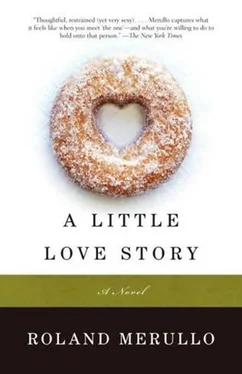Janet had two small bites. Even in her best wool sweater with her hair brushed, she looked like a woman who belonged already to another world: eyes and cheeks sunken, skin ashen, shoulders thin. I reached across the table and put my hand over her hand.
She put her fork down. “I’m being melodramatic,” she said, setting the oxygen aside as if she would never pick it up again. “I’ve been pretending it’s our last day on earth.”
“It isn’t.”
“Don’t spoil my little fantasy.”
The noisy room tilted, righted itself. The waitresses’ legs kicked past as if they were swimming there, upright.
“I’m pretending we’re in Paris.”
“I’ve always wanted to go.”
“I went once, between college and grad school. I was sitting in the Louvre when this truly ancient man sat down beside me and struck up a conversation.” She coughed, swallowed, took one careful breath. “He was Paraguayan, probably four and a half feet tall. After a few minutes he said, ‘I would like to paint you’-dramatic pause-‘in the nude.’”
“Hope springs eternal,” I said. A fresh wave of drunkenness rolled over me.
She nodded.
“He had nothing to lose. He thought he’d give it a shot.”
She nodded again. “I said no three times. He kept asking.”
“His mother told him never ever to give up,” I said, and her eyes filled right up, and my eyes filled right up, and I couldn’t get a sound out then, though I tried and tried. Don’t , I wanted to say. Not yet . But every time I tried, another little squirt of juice came up in my eyes and we were looking into two different blank middle distances, southern and western Ukraine, twin epicenters of the universe of suffering, the remains of a slice of cake between us.
WE TOOK A CAB most of the way back, then got out and walked, holding hands, along half a block of cold Manhattan night, me with my head spinning, Janet wheezing away and refusing to use the oxygen, and a circus of Christmas lights and window decorations all around us.
Up in the hotel room it was clear there would be no love-making that night-she barely had the strength to take off her sweater and clip the plastic tube under her nose-but we left the light off anyway, as if to remind each other of the pleasure we had taken from each other’s bodies, or to pretend we might take pleasure like that again. I drank three glasses of water and swallowed two ibuprofen. We took turns pissing and brushing our teeth in the dark, then climbed into the luxurious bed. She squeezed my hand once and fell asleep.
It wasn’t completely dark in the room. A thin yellow-gray light leaked in around the sides of the window drapes. The bed spun gently. When I knew Janet was asleep, I slipped my arm out from underneath her, but I lay on my back against her bare warm skin, listening to her breathe. Without meaning to, without wanting to, I started thinking about Giselle. She had tried to call me from the plane. When I came home that Tuesday afternoon, I was already just about sure she was dead-I’d called her parents. I was a big bursting bag of feelings; everyone was, that day. I hadn’t eaten since breakfast. I walked into the apartment and saw the red message light on the phone machine blinking. Eight calls. The second message was full of static and commotion, and my name spoken twice in a panicky whisper: “Jake…Jake?” I listened to it over and over and over, thirty times probably, then I went out the door and walked to the nearest bar, sat there with the television going and got stupefyingly drunk.
I put my hand on Janet’s bare leg. Sirens wailed in the street. I thought of my father, who had loved his work, loved the process of solving problems, “the business of business” he used to call it, the satisfaction of matching up investors and entrepreneurs. He smoked a pipe, he sat out on the patio, he loved to talk about it with me once I’d gotten past the stupidities of my early teenage years. “Jakie,” he said more than once, “the mistake some fellows make is they see a problem-let’s say it’s a bad problem, an almost unsolvable problem, a client over-valuing his business, let’s say-they see this problem and they either throw up their hands and surrender, and walk away from it, or they rush in like novice firemen with hoses spraying every which way. Sometimes, though, the thing to do is to sit back, hold back. You watch for a little while-sometimes it’s only sixty seconds in a heated meeting, sometimes it’s a day, a week, a year-you ponder. Occasionally it is a truly unsolvable trouble and you have to be mature enough to accept that. But usually, if you just let your mind scamper around outside the fences for a while, you see one small action you might take-a word, a shift in tactics. You tug on the knotted-up ball of string, once, here, and things begin to loosen.”
THE NEXT DAY the sky was perfectly blue between the skyscrapers, and Janet was exhausted, but glad that we’d come. I took three more ibuprofen at breakfast and pondered and waited. We drove as close as we could get to the Trade Center, down there in the tight, cluttered streets of lower Manhattan. I waited. I watched the city she loved. And then, in the truck going north, I decided to say one thing to her. I said, “I’m a big fan of doctors, you know, but I think Doctor Wilbraham is a cold, worthless, stick-up-the-ass piece of horse manure.”
She nodded, almost laughed. That’s all we said on the subject. She slept most of the way back, waking only when she coughed very hard, or to adjust the clip of the oxygen cylinder. We stopped for soup and ice cream in Providence. She coughed and coughed and slumped back in her chair and ate almost nothing.
But when we got back to the hospital and she was in the bed again, and Doctor Wilbraham came marching in and started to lecture her, she held up her hand and made him stop. “I don’t want you as my physician anymore,” she said. “I don’t care if it means being transferred to another hospital, or if it means I just go home and die, I want a different doctor now.”
He puffed and huffed but she didn’t stop looking at him. I could see the steel behind her eyes. After a while, even Doctor Wilbraham could see it.
D e c e m b e r
FOR A WHILE THEN, during the last week of November and the first week or so of December, Janet’s body went into a resting mode, as if preparing for some great private exertion. I had been writing to my brother about her every few weeks, and some where near the start of December I sent Ellory a note saying she was not getting better and asking him to pray for her-not the kind of thing I had ever done. Janet’s new doctor was a very small, coffee-skinned, tight-mouthed fellow named Ronald Ouajiballah. He was from Fiji or the Solomon Islands, I could not remember which, and he was as different from Eric Wilbraham as two people in the same profession can be. Even the way he touched Janet was different. I never saw him at her bedside when he didn’t have a hand on her shoulder or arm or foot, and it was a personal, not a professional hand, the touch of a cousin with a medical degree. He switched around her medicines, beefing up the Albuterol inhaler with another steroid, adding into the IV mix an antibiotic cocktail called Zithromax, which was used for bronchitis and sinus infections, and usually prescribed for CF patients with less lung damage. He discovered she had some kind of allergy called ABPA, and prescribed prednisone. All of this seemed to help her breathe more easily.
What helped her most was just that, without pretending everything was fine, il dottore , as we called him, didn’t stop trying, and didn’t seem to have built up a wall to protect himself from his patients’ pain and discomfort. When the flesh around the shunt in Janet’s right arm became inflamed he had the nurses move it right away; when the pain of the strenuous coughing overwhelmed her, he was there with Valium or Oxycodone-she did not have to whimper and scream to make it real to him.
Читать дальше












